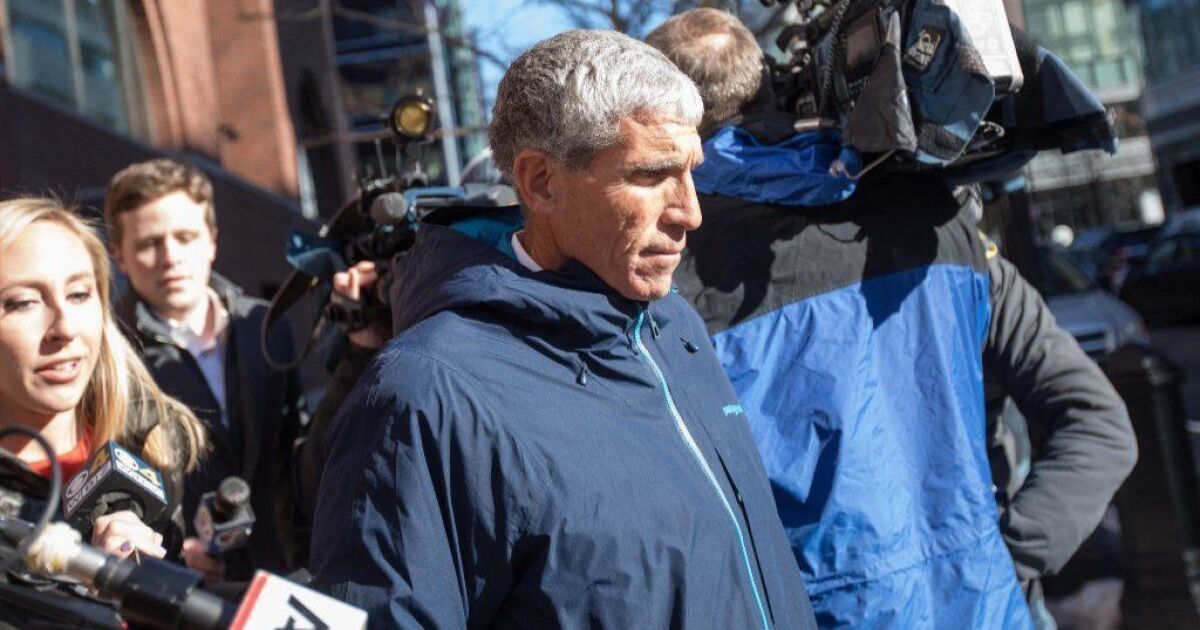A Newport Beach woman has agreed to plead guilty to conspiracy to commit wire fraud, admitting she plotted with William “Rick” Singer, the consultant at the center of the college admissions scandal, to have an employee take online classes for her son and submit them to Georgetown.
Karen Littlefair will plead guilty by Jan. 17 to one count of conspiracy to commit wire fraud, according to a plea agreement signed in November and unsealed Monday. She acknowledged paying Singer $9,000 for one of his employees to take four online courses for her son, a Georgetown student.
“My client took the earliest opportunity to take responsibility for the conduct set forth in the plea agreement,” said her lawyer, Kenneth B. Julian. “She’s doing the right thing, early.” He declined to comment further.

Karen Littlefair with her husband, Andrew, in 2014.
(Daily Pilot)
Littlefair is the 36th parent charged in the admissions scandal by the U.S. attorney’s office in Massachusetts. Beneath the threat of new charges, all but 16 have pleaded guilty. Most of the parents who have maintained their innocence — a group that includes actress Lori Loughlin and her husband, J. Mossimo Giannulli, a fashion designer — have been charged with additional felonies and now face charges of conspiracy to commit fraud, money laundering and bribery.
Singer has pleaded guilty to four felonies and cooperated with the government. He is awaiting sentencing.
Unlike the other parents implicated in Singer’s scam, Littlefair isn’t alleged to have bribed college coaches to misrepresent her son as an elite athlete; nor did she pay a test administrator to tamper with his exams, prosecutors say. Instead, she has admitted paying Singer to have an employee take online courses in her son’s place to help him graduate from Georgetown.
Prosecutors agreed to recommend a sentence of four months in prison, 12 months of supervised release and a $9,500 fine, according to her plea agreement.
Littlefair, a Newport Beach socialite who has hosted fundraisers for Republicans Jeb Bush and Kevin McCarthy at her Lido Isle home, at one point asked Singer for a discount because his employee had earned her son a C in one course, charging documents say. “The experience was a nightmare!” she wrote in an email.
Singer told her he wouldn’t reduce the $3,000 price because the “process was a nightmare for all.”
Littlefair’s son graduated from Georgetown in May 2018 “based, in part, on the academic credits fraudulently earned by” Singer’s employee, the charging documents say. The employee, a woman, wasn’t identified. The courses she took for Littlefair’s son were offered by Georgetown and Arizona State University.
Prosecutors allege that Mikeala Sanford, another of Singer’s employees, facilitated the fraud by helping Littlefair iron out the logistics of having someone other than her son take his classes.
One online course offered by Georgetown required video conferences with the professor. Because her son was out of the country, Littlefair told Sanford and the unidentified Singer employee that they “should have a stand-in for [my son].”
Sanford was previously charged with conspiracy to commit racketeering and fraud. She has pleaded not guilty. Her attorney didn’t respond to a request for comment.
Attorneys for eight parents charged in the scandal requested on Monday recordings of thousands of phone calls between Singer and his clients that were either intercepted through court-authorized wiretaps or recorded by FBI agents once Singer began cooperating in September 2018.
The government determined only a fraction of those calls were relevant to the case and subject to disclosure, the attorneys said in a motion. Agents intercepted more than 9,000 calls and texts through wiretaps during a six-month period, according to the filing, and Singer placed more than 8,000 calls and texts as a cooperating witness between September 2018 and March of this year.
The recordings Singer made while cooperating, the attorneys wrote, will probably show he attempted to interfere with the investigation, lied to new clients, exaggerated his credentials and tried “to broaden his ‘legitimate’ business interests while he is cooperating, indicating a subjective belief that he will not be incarcerated.”
Singer boasted on recorded calls of enjoying access to college deans, coaches, athletes, celebrities and other “recognizable, well-respected people as a means of fostering trust with his clients and boosting his perceived legitimacy,” they wrote.
“The absence of such prior interceptions would prove he was lying,” Martin Weinberg, an attorney for two charged parents, told prosecutors in a letter.
